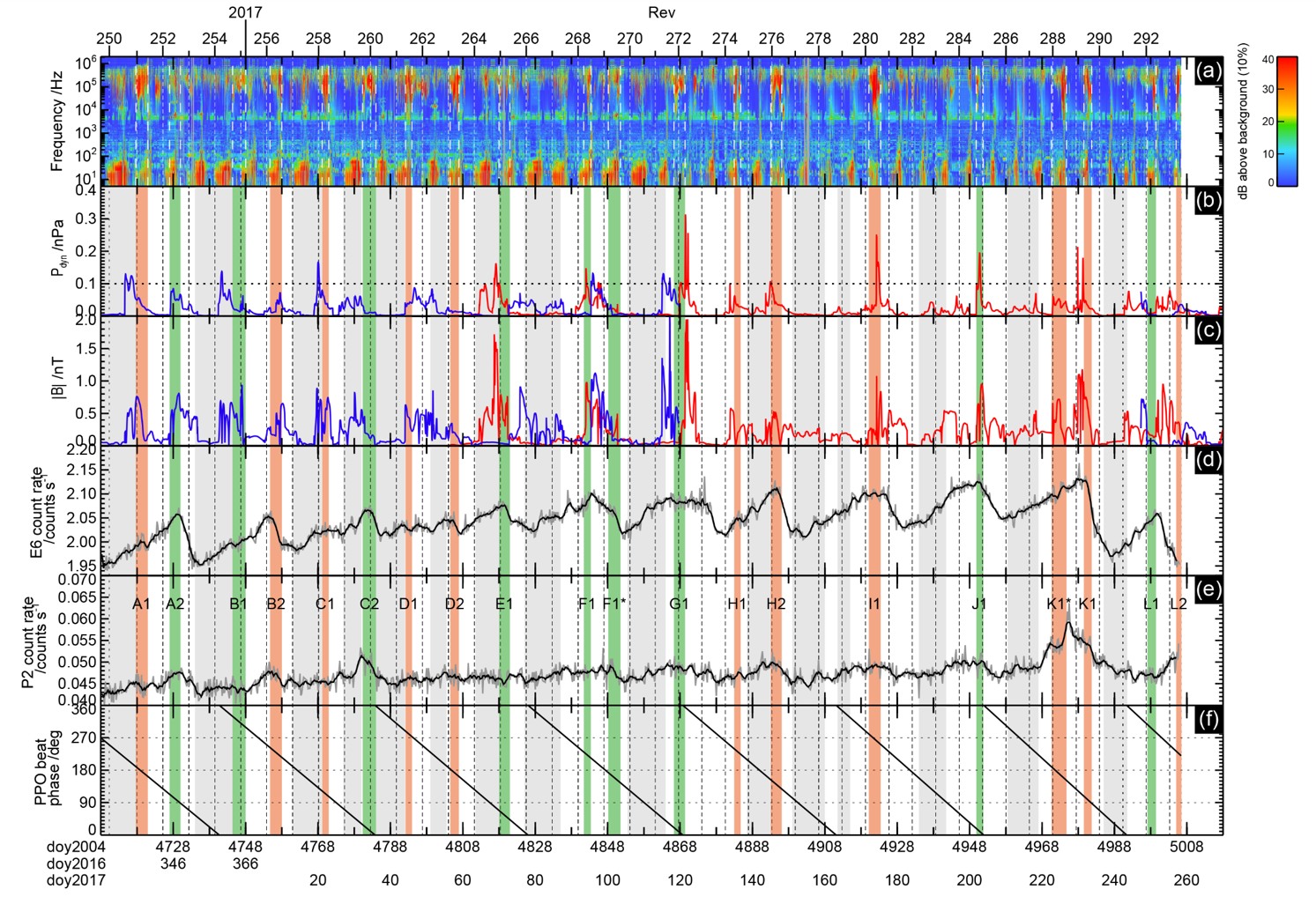MIST
Magnetosphere, Ionosphere and Solar-Terrestrial
Saturn’s Nightside Dynamics During Cassini’s F Ring and Proximal Orbits: Response to Solar Wind and Planetary Period Oscillation Modulations
By Tom J. Bradley (University of Leicester)
In this study we examined the final 44 Cassini spacecraft orbits that traversed the midnight sector of Saturn’s magnetosphere to distances of ~21 Saturn radii, in order to investigate responses to heliospheric conditions inferred from model solar wind and Cassini galactic cosmic ray (GCR) flux data.
Clear responses to anticipated magnetospheric compressions were observed in magnetic field and energetic particle data, together with Saturn kilometric radiation (SKR), auroral hiss, and ultraviolet auroral emissions. Most compression events were associated with corotating interaction regions, as shown by the periodic model solar wind parameters and Forbush-like decreases in GCR fluxes in Figure 1.

Figure 1: Overview of full dataset. Figure 1a shows a RPWS spectrogram, and Figures 1b-1e show model solar wind dynamic pressure (nPa), IMF strength (nT), LEMMS channel E6 count rate (GCR flux of >120 MeV protons), and LEMMS channel P2 count rate (GCR flux as well as SEP flux of 2.3-4.5 MeV protons). Figure 1f shows the PPO beat phase (deg modulo 360°). The superposed red and green shaded vertical bands (white dashed lines in Figure 1a) show intervals of magnetospheric compression defined by criteria given above. Red corresponds to major events with an extended LFE interval (longer than one planetary rotation) and green to minor events without such an extended LFE interval. The superposed grey shaded vertical bands show intervals of relative magnetospheric quiet when energetic particle fluxes were at near-minimum values.
Each compression tended to produce ~2-3.5 day intervals of magnetospheric activity that were typically recurrent with the ~26 day solar rotation period (one or two such events per rotation). However, the responses were somewhat variable (as is shown in greater detail in the article), and were thus divided into “major” and “minor” events. Major events (red shaded bands) are those with SKR low frequency extension (LFE) intervals with durations greater than ~one planetary rotation (11 out of 20 events, or 55%), while minor events (green shaded bands) either have no noticeable LFE interval (7 out of 20 events, or 35%), or one whose duration is one planetary rotation period or less (2 out of 20 events, or 10%)
These two types of responses were found to be modulated by Saturn’s planetary period oscillations (PPOs), as follows.
- Major events are favoured when the two PPO systems are roughly in anti-phase, where they act together to thin and thicken the tail plasma sheet during each PPO cycle. The anti-phase conditions during major events result in thin plasma sheet conditions (once per rotation), that are most unstable to tail reconnection, producing energetic nightside particle injections and poleward contractions of dawn-brightened auroras.
- Minor events are favoured when the PPOs are in phase, where they act together to stabilise the plasma sheet and inhibit tail collapse, resulting in less obvious magnetospheric responses.
Overall, the results emphasize how strongly activity in Saturn’s magnetosphere is modulated by both the concurrent heliospheric conditions and the PPO modulations.
Please see the paper for full details:
Bradley, T. J., Cowley, S. W. H., Bunce, E. J., Melin, H., Provan, G., & Nichols, J. D., et al. (2020). Saturn's nightside dynamics during Cassini's F ring and proximal orbits: Response to solar wind and planetary period oscillation modulations. Journal of Geophysical Research: Space Physics, 125, e2020JA027907. https://doi.org/10.1029/2020JA027907